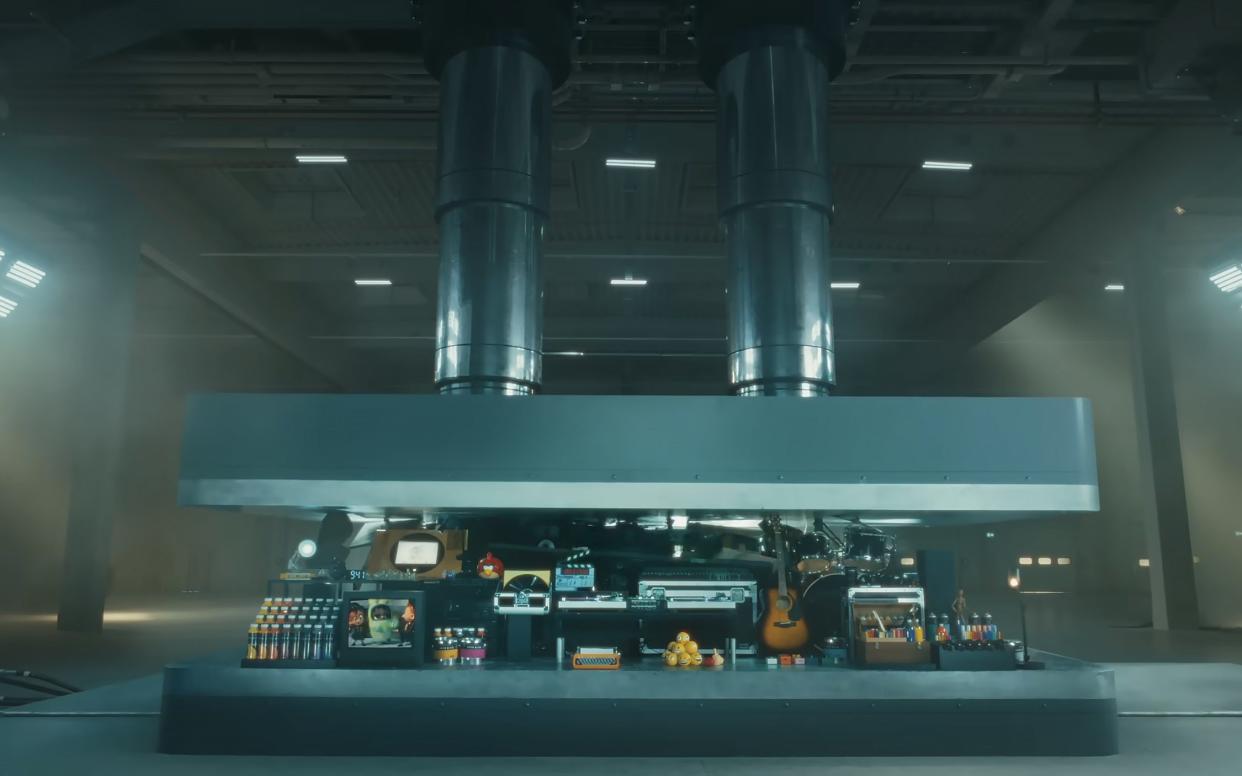Steve Jobs would have sacked everyone involved in Apple’s awful iPad advert

- Oops!Something went wrong.Please try again later.
With just two bad jokes at the Royal Albert Hall in 1991, Gerald Ratner destroyed his company’s reputation. Last week Apple had a go, but on a much bigger budget.
In a TV advertisement by the company, a wide variety of musical instruments, creative tools and materials and games are all annihilated by a giant black slab. Even a vintage Space Invaders-style arcade console is flattened.
The ad revels in their destruction and nothing is left at the end but the new iPad, which we are informed is a little thinner now: 0.6mm thinner, in fact.
Rarely has the reaction to an advertisement ever been so unanimous. For the art critic JJ Charlesworth, the video was, “in the most degraded way, an expression of loathing for material culture, creativity and tactile sensuality”, he wrote. “Imagine a hell where the only culture that existed was trapped on a screen.”
Many others also baulked at the quasi-fascistic image of power imposed from above, where individuality is crushed, and resistance is futile. If we wanted an illustration of the arrogance of the modern tech titans, the 21st century Robber Barons, then Apple has just made it for us.
“We missed the mark with this video, and we’re sorry,” the company owned up, as it withdrew the ad from circulation. “Crush” will not appear in the pre-booked TV slots, but the damage has been done.
In the past, Apple has shamelessly co-opted artistic genius to build its luxury brand before. It tries to persuade us that all the cool, creative people use Apple products, while only boring normies use those made by its rivals. Poor people, and people with no taste, in other words. Don’t be like them!
Today, the “Ratner Moment” is taught in business lessons as an executive disaster-class in what not to say.
The chief executive joked that the jewellery he sold is so cheap that it would be outlasted by a prawn sandwich from Marks & Spencer.
Today, with each customer investing thousands of pounds in the Apple ecosystem of products, we’re not going to abandon the company overnight. But it’s worse than “doing a Ratner”, because it dramatises how Big Tech views us, and what we value.
We recoil from such imagery because we know that we really don’t need to destroy something beautiful to create something interesting and new.
That was the proposition the town planners insisted we must accept in the 1960s, as they laid waste to our beautiful Victorian heritage, and what Russell T Davies and Disney maintain today, as they take an axe to Doctor Who.
It’s false, however. Old things can take on new forms and find new uses. As a builder you can add, not subtract. Our disquiet is heightened by the imminent arrival of what’s branded as artificial intelligence, and a great flood of derivative, low quality “content paste”.
It’s making the world duller because it’s all derivative and feels much less human. It’s coming at a great cost to human creators.
How could Apple misjudge the audience so badly? Steve Jobs would surely have been appalled, and sacked everyone involved: including Tim Cook, the paperclips guy who took Jobs’ seat. Perhaps Apple is lost without its late co-founder, and we only now see how badly lost it is.

The Crush TV ad really chills because it reveals a psychopathy that can be found with the titans of Silicon Valley: a generation of immature man-children who believe they are worthy Masters of the Universe, capable of bending reality to their will.
One notorious example is the venture capitalist Marc Andreessen’s recent “Techno-Optimist” manifesto.
Anyone who queries Andreessen’s version of the future – one where restraints on his behaviour have been removed – must be motivated by “fear, guilt, and resentment”.
But “tech has no manifest destiny”, counters Neil Turkewitz, a former music industry executive turned creator rights advocate. “It’s up to us to determine its arc.”
The brilliant popular historian Rick Perlstein recalls attending a book club held at Andreessen’s palatial home, in which the former small town boy made good “made it clear that people who chose not to leave such places deserved whatever impoverishment, cultural and political neglect, and alienation they suffered”. Such contempt is evident in the Crush ad, too.
Art critic Charlesworth also wondered if “Apple has realised it hasn’t got any fresh ideas for products and now just wants to smash everything up”.
In truth we don’t know, because Apple, like the other Big Tech giants, doesn’t need to try very hard to create new things – the new iPad that “Crush” promotes is almost identical to the one it replaces.
Because Apple knows once we’re locked in, it can extract a rent from us, and from business sectors like finance and third-party developers, via the subscription and service fees we will pay forever. Technology has become a cosy oligopoly.
Perhaps we can use the PR disaster as a reminder of the inventiveness of the unsung scientists whose work allows the iPad to get 0.6mm thinner every two years. Much of technology is built on stolen valour.
To all those creators who Apple insulted last week: new inventions and creativity keep the world feeling fresh and alive, rather more than the complacent technology giants do today as they count their profits and wonder what on earth to do next.

